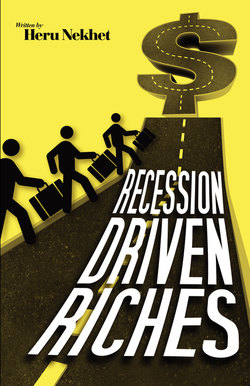Читать книгу Recession Driven Riches - Heru Nekhet - Страница 9
На сайте Литреса книга снята с продажи.
ОглавлениеAcknowledge and Accept the New Normal
“There are disturbing trends: huge imbalances, disequilibria, risks – call them what you will. Altogether the circumstances seem to me as dangerous and intractable as any I can remember, and I can remember quite a lot.” - Paul Volcker
“And since home values always go up, the stock market is recession proof, and I can always go out and find another job that will pay me even more than the one I have now, what’s the problem?” - Jeff Yeager from “The Cheapskate Next Door”
The end of the Great Depression (which lasted 43 months) birthed the last great economic era in US history, and catapulted the US as a world leader in manufacturing, industry and export. As European nations fought on their own soil during World War II, American factories began to make war goods to sell to nations like Britain. After the war, most of the rest of the world was in ruins. This gave the US, which remained intact, the opportunity to surpass the rest of the world in manufacturing, industry and export. The US enjoyed a natural trade advantage which allowed for the easy repayment of the war generated deficit. In addition, the veteran’s educational and housing benefit given to returning veterans resulted in increased productivity and a construction boom.
The devastation of much of the developed world coupled with innovations in the industrial age, such as electricity in many US homes, assembly line manufacturing, investment in the national highway system, etc. sparked the growth of behemoth corporations that monopolized markets both domestically and abroad. Their size meant they could benefit from economies of scale and provided high entry barriers to would be competitors.
The Industrial Age was emphasized by the role of technology. Many jobs became automated. Machines replaced some workers while other workers became more specialized. Labor specialization, control of raw materials and facilitating technology were the critical elements to economic success. Money was made slowly and methodically.
As market demands change, technology improves and the means of production becomes more efficient we transition into new ages marked by significant changes in the economy. The 1990s was an era of dramatic and rapid improvement in information and communication technology, accompanied by more efficient means of production which led to price falls which made the technology accessible to a larger segment of the population. The rapid spread of the Internet gave this massive market unprecedented access to vast quantities of information, as well as enabling communication and the formation of alliances unhindered by physical distance; or national or political borders.
Yes, we are in a recession, but a recession is merely one phase of a never ending cycle. This phase will play out and another, very different phase will follow. Since the end of World War II, we have gone to the Atomic/Space Age, then to the Information Age and now we are transitioning into the Age of Innovation.
“The innovation age is defined by user-defined advancements, effortless collaboration and rapid (almost constant) change. The maturing Information Age has resulted in a climate where information has become a commodity and available to everyone for little to no cost. The coming Innovation Age, in contrast, will determine how people utilize all of the information available to them in order to produce new products, services, experiences, etc. This is the point of separation between those organizations that thrive in the new “Age” and those who are left behind. Positioning your organization to adopt and leverage these attributes gets you in the game.” (Paul Williams)
The innovation age has also brought us a true borderless economy in which the globalization of markets has caused both international competition and international opportunities. The rapid advancements in technology that mark this age, make business and investing more efficient, and less costly, thus significantly decreasing the time it takes to make a profit. The flip side of that coin is that businesses and investments will be made obsolete faster as well. There will be few indicators to forewarn that a business or investment is about to lose money. The loss will come suddenly and dramatically. Promises of changes in infrastructure, and a move towards green technology offer hope for a very profitable future for those who position themselves to take advantage of the inevitable changes. The only uncertainty in the new age is how government will respond to the economic changes in regards to regulation and deregulation in order to facilitate entry into new opportunities.
Important Changes to Pay Attention To:
Societal attitudes towards working, saving, spending and borrowing will shift.
The structure of industries will change. Weak or less adaptive companies and industries will go under.
The world economy will become less US-centric as China is poised to resume as the world’s dominant economic superpower by 2025.
Creditors and Investors will be gun shy for a long time.
There will be less competition in most areas.
